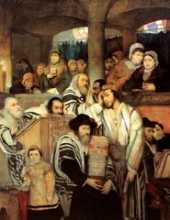Shabbat Shalom and welcome to Judeo Talk. The Torah portion for this week is Parsha Ha'azinu, Deuteronomy 32:1-32:52.
This week, we read from the penultimate parsha in the Tanakh, the Five Books of Moses. Ha'azinu is a poem, the second to last poem he ever recited. It is, without a doubt, a piece meant to literally put the fear of God in his people. But we can't look at the verse of Ha'azinu as a stand-alone piece. Indeed, the last thing Moses ever does before he dies in next week's parsha is speak a blessing over the Israelites. Anyone who has spent a decent amount of time studying Torah should know that this order of events is significant. The fear is not the last word, but the blessing.
This sentiment rings true throughout the Torah. Even within the terrifying language of Ha'azinu, there is a hint of moral certainty. It talks about violence, about war and iniquity. It paints a picture of a life consumed by these things and how awful such an experience would be. There is a loneliness to it as well. Moses speaks as an individual, not as a nation. The focus is not on "us" but on "me", the solitary life of the warrior without God or anyone else. This violent life is the old life, the life without God or law. The future, the Promised Land, is a life beyond that constant war.
I have written many times now about the essential metaphor of the Promised Land and the holy life. I cannot stress the idea enough that "Israel", "Zion" is a state of being, not a physical place. Moses's poem in Ha'azinu describes the way people experienced life in his time and place prior to the advent of law, but he is also talking about the painful, confusing existence of the individual prior to spiritual clarity.
As we contemplate our lives in the Days of Awe, we should read Ha'azinu as a call to think of all our past mistakes and problems. How long will we stand on our own Mount Nebo, able to see the Promised Land but not able to enter it? As these final passages of the Tanakh have stated both directly and in allegory, we all already know how to be better people, how to be individuals of peace and prosperity, it's just a matter of taking those necessary steps forward.
As we approach Yom Kippur, we will be asked to think on our guilt, but it's not meant to be a wallow. Guilt is our minds' way of acknowledging the wrongs in our lives while simultaneously noting the right that was never done. This means, at best, that we know what is right. The Days of Awe are a time for us to re-commit ourselves to choosing the right in the coming year where today we only have the guilt of choosing the wrong in the year that passed.
Shabbat Shalom. I wish you all an easy fast and a meaningful day of reflection on Yom Kippur.
